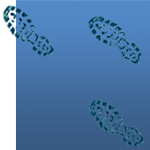|
Quite often, photography is just a
calling card, an excuse to happen upon something amazing without anyone
questioning why I'm still staring.
So it was that I swung by the
Indianapolis Zoo one morning. I started at their Simon Skjodt International
Orangutan Center, and late in the afternoon, I was still there.
The viewing areas had a section
where the orangutans could hop up on a ledge and sit inches away on the other
side of the glass. One took an interest in my photo bag, looking intently at
what I pulled out. It made hand gestures to tell me to turn my fisheye lens
around so it could see the backside. It followed my every move as I swapped
lenses. I felt it learning, like it wanted to understand cameras -- or perhaps
fooling me when it really wanted to know how lenses tasted.
We spent some time amusing each
other, blurring the arrangement about who was on exhibit. And then came the
moment when it looked up, right into my eyes and held its gaze, searching for
clues about who I really was. The sensation was like a forbidden gaze stumbled
into with a fast food counter clerk who forgets to avert her eyes after handing
over my burger.
No, I haven't been on the road so
long that I'm looking for love in all the wrong places. It was a look of
wordless communication. It spoke of confinement, how she wanted to touch me, to
explore. Yet the eyes also spoke of merriment, how I looked comical so hairless
and gangly legged.
The look grew from the eyes to
searching each others faces. I stopped being able to think of the orangutan as
an it. It became a she, a person wondering about me even as she revealed
herself. I put a palm on the glass against hers. She didn't retract hers, but
stared at my fingers, perhaps wondering how I could get by with such sickly
little digits.
But the epiphany came later in
their computer lab. The orangutans had their own computer, and they used it to
match text terms and spoken requests to pictures and symbols. They were not
doing tricks for us; they stopped to look over the screen and thinking was as
plain as the lack of a nose on their faces. Given all the years I've taught
computers, I was amazed to see the same perception, learning, discernment, and
finally insight. The recognition of kinship was undeniable.
For days to follow, I thought about
the relatives I had chanced upon, and decided to get involved. Those who read
my story about the evolutionary origins of
music
wouldn't be surprised that I started wondering if my new-found kinfolk had
primitive vestiges of musical appreciation.
So it was that I contacted Dr. Ron
Shumacher, the Zoo Director, and proposed building a music lab for the
orangutans. Next I contacted P.D.Q. Bach, alias Peter Shickele (distant
modern-day relative), a famous musicologist, and there is now the possibility
of a team forming to give the orangutans and us a place where our loneliness as
a sentient species may be further assuaged.
People who see me dragging my
camera around probably don't suspect how often the camera is dragging me
around. |

